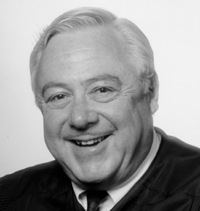Thomas Penfield Jackson
| Thomas Penfield Jackson | |
|---|---|
 |
|
| Judge for the United States District Court for the District of Columbia | |
|
In office June 25, 1982 – January 31, 2002 |
|
| Nominated by | Ronald Reagan |
| Preceded by | Oliver Gasch |
| Succeeded by | Rosemary M. Collyer |
| Personal details | |
| Born | January 10, 1937 Washington, D.C., U.S. |
| Died | June 15, 2013 (aged 76) Compton, Maryland, U.S. |
| Alma mater |
Dartmouth College (A.B., 1958) Harvard Law School (LL.B., 1964) |
| Military service | |
| Service/branch | United States Navy |
| Years of service | 1958–1961 |
Thomas Penfield Jackson (January 10, 1937 – June 15, 2013) was a judge for the United States District Court for the District of Columbia.
Jackson was born in Washington, D.C. He graduated from Dartmouth College with an A.B. in the class of 1958, and from Harvard Law School with a LL.B. in 1964. He served in the United States Navy from 1958 to 1961. He was appointed to the Court in 1982 after serving as president of the District of Columbia Bar Association, filling the seat vacated by Oliver Gasch. He assumed senior status in 2002 and retired in 2004. Until his death, he worked as an attorney with the Jackson and Campbell, P.C., law firm.
He is perhaps best known to the public as the presiding judge in the United States v. Microsoft case. Jackson was the first in a series of judges worldwide to determine that Microsoft abused its market position and monopoly power in ways that were highly detrimental to innovation in the industry and consumers of the products. The summary paragraph in his findings of fact is quoted below.
Most harmful of all is the message that Microsoft's actions have conveyed to every enterprise with the potential to innovate in the computer industry. Through its conduct toward Netscape, IBM, Compaq, Intel, and others, Microsoft has demonstrated that it will use its prodigious market power and immense profits to harm any firm that insists on pursuing initiatives that could intensify competition against one of Microsoft's core products. Microsoft's past success in hurting such companies and stifling innovation deters investment in technologies and businesses that exhibit the potential to threaten Microsoft. The ultimate result is that some innovations that would truly benefit consumers never occur for the sole reason that they do not coincide with Microsoft's self-interest.
Microsoft attempted to show that the judge's conduct during the case demonstrated that he unfairly favored the prosecution, but they failed to do so in court proceedings. He did speak to a reporter off the record after the evidence in the case had been heard but prior to issuing his "Conclusions of law" and this was contrary to judicial rules. Speaking with that reporter he expressed unfavorable opinions and statements about Microsoft Corporation and its employees which he had developed as a result of hearing the evidence and witnesses in the trial. Speaking about Microsoft executives, he compared them to "stubborn mules who should be walloped with a two-by-four" and "gangland killers", referring to a murder case he presided over four years earlier:
...
Wikipedia
